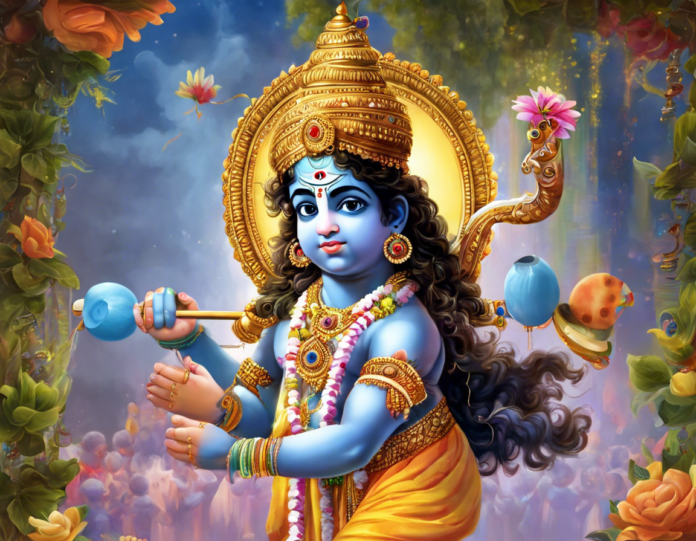Janmashtami, also known as Gokulashtami, is a widely celebrated Hindu festival that commemorates the birth of Lord Krishna. This auspicious occasion falls on the eighth day of the Krishna Paksha in the month of Bhadrapada in the Hindu calendar. During Janmashtami, devotees observe fasts, perform puja (ritual worship), sing bhajans (devotional songs), and engage in celebrations that last throughout the day and into the night.
Significance of Janmashtami
Janmashtami holds immense significance for Hindus as it marks the birth of Lord Krishna, who is considered the eighth avatar of Lord Vishnu. According to Hindu mythology, Lord Krishna took birth to rid the world of evil, establish dharma (righteousness), and to guide humanity on the path of righteousness.
Celebrating Janmashtami
The festival of Janmashtami is celebrated with great fervor and enthusiasm across India and in many parts of the world. Devotees decorate their homes and temples with flowers and lights, prepare elaborate feasts, and participate in various cultural programs and rituals to honor Lord Krishna.
Janmashtami Status for Social Media
Sharing festive greetings and messages on social media has become a popular way to celebrate and connect with loved ones during festivals. Here are some Janmashtami 2023 status ideas that you can use to convey your wishes and blessings:
1. “Wishing everyone a blessed Janmashtami! May Lord Krishna’s teachings inspire you to live a righteous and fulfilling life. Jai Shri Krishna!”
2. “As we celebrate the birth of Lord Krishna, may his divine presence bring peace, love, and prosperity into your life. Happy Janmashtami!”
3. “On this auspicious occasion of Janmashtami, may the blessings of Lord Krishna fill your life with happiness and harmony. Radhe Radhe!”
4. “Let’s celebrate the birth of the immortal peacemaker, Lord Krishna, who continues to inspire and guide us towards righteousness. Happy Janmashtami!”
5. “May the melodious tunes of Lord Krishna’s flute fill your life with joy and contentment. Wishing you a blessed Janmashtami filled with love and devotion!”
6. “On this divine day of Janmashtami, may Lord Krishna bless you with strength, wisdom, and devotion to overcome all challenges. Jai Shri Krishna!”
Frequently Asked Questions (FAQs) About Janmashtami:
1. What is the significance of fasting on Janmashtami?
Fasting on Janmashtami is believed to cleanse the body and mind, allowing devotees to focus on spiritual activities and connect with the divine energies of Lord Krishna. It is a way to show dedication and reverence towards the deity.
2. How is Janmashtami celebrated in different regions of India?
Janmashtami is celebrated with various customs and traditions in different parts of India. For example, in Mathura and Vrindavan, the birthplace of Lord Krishna, elaborate processions and reenactments of his childhood feats are organized. In Maharashtra, people enact the Dahi Handi ritual, where clay pots filled with buttermilk are hung high, and teams attempt to break them.
3. Why is Lord Krishna often depicted with a flute?
Lord Krishna is often depicted holding a flute, which symbolizes divine music and the call of the soul. The melodious tunes of his flute are believed to enchant the hearts of devotees and all beings, spreading love and joy.
4. What is the significance of chanting ‘Hare Krishna’ mantra on Janmashtami?
Chanting the ‘Hare Krishna’ mantra is considered a powerful way to invoke the blessings of Lord Krishna and connect with his divine presence. It is believed to purify the mind and soul, leading to spiritual awakening and inner peace.
5. How can one observe Janmashtami at home?
To observe Janmashtami at home, devotees can decorate a small cradle or idol of Lord Krishna, perform aarti (ritual of worship), offer bhog (food offerings), recite bhajans and prayers, fast, and engage in reading or listening to the stories of Lord Krishna’s life.
6. Is it necessary to observe a strict fast on Janmashtami?
While many devotees observe a strict fast on Janmashtami, it is not mandatory for everyone. Fasting is a personal choice, and individuals may choose to fast partially, abstain from specific foods, or focus on spiritual activities to mark the occasion.
7. Can non-Hindus participate in Janmashtami celebrations?
Yes, Janmashtami is a festival that welcomes people of all backgrounds to participate in the celebrations. Non-Hindus can join in the festive rituals, attend cultural programs, visit temples, and learn about the significance of Lord Krishna’s teachings and life events.
8. What is the importance of offering ‘bhog’ to Lord Krishna on Janmashtami?
Offering ‘bhog’ to Lord Krishna is a way of expressing gratitude and devotion towards the deity. The food items prepared as bhog are considered sanctified by the blessings of the Lord and are later distributed among devotees as prasad (blessed food).
9. How can children be involved in Janmashtami celebrations?
Children can be involved in Janmashtami celebrations by dressing up as Lord Krishna or Radha, participating in fancy dress competitions, singing devotional songs, decorating jhankis (tableaux), and listening to stories of Lord Krishna’s childhood adventures.
10. What is the spiritual significance of observing Janmashtami?
Observing Janmashtami is not just a cultural celebration but also a spiritual practice that allows devotees to deepen their connection with Lord Krishna, seek his blessings for guidance and protection, and strive to embody his virtues of love, compassion, and righteousness in their lives.












